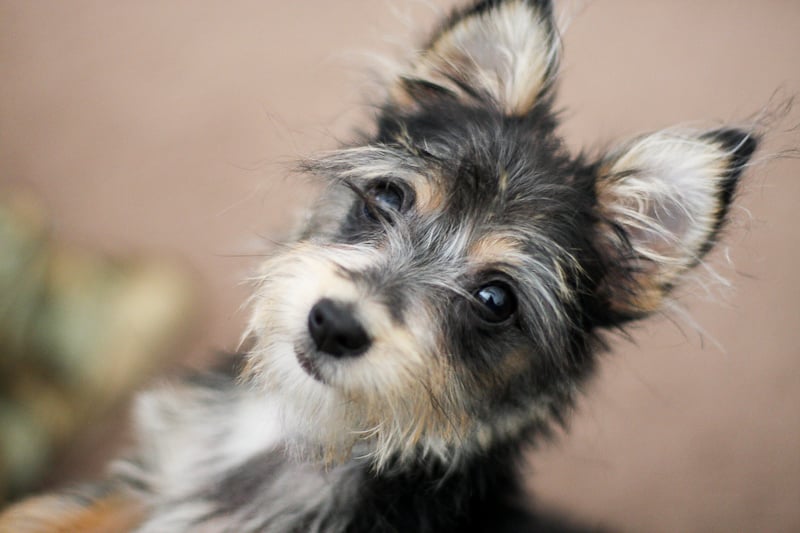You’ve heard of a Chihuahua and a Yorkshire terrier (also known as a Yorkie). But have you ever heard of a Chorkie dog? This is a tiny terrier that mixes the two purebreds. And the resulting hybrid breed is one of the cutest small dogs you’ll ever encounter.
But just because it’s adorable doesn’t mean the Chorkie is the perfect dog for you. Learn more about this small crossbreed, and find out if you’ve met your match.
Breed Characteristics
- Origin: United States
- Size: tiny
- Average Lifespan: 10-15 years
- Energy Level: high
- Breed Group: toy dog/designer dog
Breed Appearance
Because of its mixed pedigree, it can be challenging to predict the appearance of Chorkie dogs. They will likely take on some physical traits of both the Chihuahua and the Yorkie.
According to PetGuide, Chorkies usually have the distinctively long and silky hair of the Yorkshire terrier. And while retaining the head shape of the Chihuahua, it can be shaped like an apple or deer head. In most Chorkies, you can expect the ears to stand tall like a Chihuahua. But it’s not unheard of for a Chorkie to have drooping ears.
Since the Chorkie usually has hair similar to the Yorkie, it also has exact grooming needs. Their long, human-like hair can either be left long or cut short. If it’s kept long, it will require daily brushing to avoid tangles. To keep the hair out of your Chorkie’s eyes, their hair will need to be trimmed around the face or clipped back.
Chorkies need baths every one to two weeks. Their small size makes it simple enough to do yourself in the kitchen sink—no trip to the groomer required.
Even though Chorkies tend to take on the hair of the Yorkie, they may not take on the coloring. At the same time, Yorkshire terriers are usually black, tan, and gray. Chorkies may also develop Chihuahua coloring, which can include white, chocolate, brown, fawn, cream, red, or a mix of all of those colors.
A Chorkie’s size
A Chorkie’s size also falls between its two parent breeds, with Chihuahuas, the smaller of the two breeds, usually growing to 5-8 inches and no more than 6 pounds.
Yorkshire terriers aren’t much more significant, often reaching 7-8 inches in size and around 7 pounds. No matter which parent the Chorkie takes after in size, you can guarantee it will grow into a tiny dog.
Chorkie Personality

Much like their appearance, the personality of a Chorkie can be slightly unpredictable due to their mixed pedigree. They may take on the nature of a Yorkie, which, much like other terriers, tends to be spunky, courageous, willful, and bossy. Chihuahuas are also tiny dogs that pack a big attitude, often displaying intelligent, stubborn, and domineering traits.
Both the Chihuahua and the Yorkshire terrier are breeds known for their barking, so don’t expect a lot of quiet time with a Chorkie in your household. If they take after the Chihuahua, a Chorkie may be anxious around new people, though they tend to warm up to strangers quickly. They may also not take to other dogs—huge ones—and often enjoy being the only dog in the house.
Chorkie Dogs are playful, demanding your attention many times throughout the day. Luckily, both breeds are also loyal and loving—and frequently up for a cuddle—meaning that no matter what personality traits are dominant in your Chorkie, you can almost guarantee they will show you enough love to balance out all that attitude.
Ideal Environment
Chorkies are primarily inside dogs and should be kept indoors for the most part, except for short trips outside for walks and play.
Chorkie dogs, much like their parent breeds, are often tiny balls of energy. However, their small size ensures they can still thrive in small spaces like apartments and condominiums.
Ideal Human
The small size of a Chorkie dog makes them ideal for anyone living in an apartment or an urban setting without much of a yard. They’re also great companions for seniors since they only require short, slow walks—sometimes, just following their person around at home is enough movement for the day.
Their tiny size may make Chorkie dogs cute, but they can also be somewhat fragile. For this reason, they may not be the best dogs for households with small children who aren’t able to handle them with care since they love fiercely and demand a lot of attention. They’re not the best choice for households where they would be alone frequently.
Chorkies also don’t do well in the cold weather. So, bundle them up for even short trips outside during winter weather.
Get the latest Chihuahua Buzz
Chorkie Training
The Yorkshire Terrier and the Chihuahua are intelligent dogs that are pretty trainable. They’re also both stubborn, however, a trait that can make training a long (and sometimes frustrating) process.
According to the American Kennel Club, both breeds are eager to please and respond well to positive training reinforcement. Instead of harsh words and actions for bad behavior, It should reward good behavior with praise and treats.
Both breeds of dogs are also confident and will attempt to rule the household if they aren’t taught who is in charge early. This means humans should never accept behavior from a Chorkie puppy that won’t be acceptable from a Chorkie adult. Their bossy behavior may be cute when they’re tiny. But remember that it could be less appealing than a full-grown dog.
The Yorkshire terrier and the Chihuahua also tend to be anxious around other humans and dogs. So socialization should start from a very young age. It can accomplish this with walks or trips to the pet store or dog park. Obedience classes are also a great place to meet other dogs. And a way to knock out two tasks at once.
Clever dogs like Chorkies also enjoy mental stimulation, making them good candidates for agility training.

Via Flickr/Phae
Chorkie Health
Everyone wants a healthy dog, and there has been some debate over whether mixed-breed dogs, like the Chorkie, are more beneficial than their purebred counterparts. According to the Institute of Canine Biology, a recent study has supported the theory that a mixed-breed dog has a better chance of good health than a purebred.
According to the study, purebred dogs have a higher chance of developing genetic disorders—especially those more particular to the breed—so while they still have a chance of developing those disorders, the chances are slimmer.
Some issues known to face Chihuahuas are heart issues, eye disease, and epilepsy. Yorkshire terriers are also prone to eye disease and knee issues.
Since both are generally healthy breeds on their own, a Chorkie dog is likely to have few significant health issues, though you should watch out for skin issues and allergies, according to PetGuide.
Breed History
Chorkies are a relatively new breed of designer dog. While not much is known about when they originally crossed the Chihuahua and the Yorkshire terrier, the breed rose to popularity in the 1990s in the United States.
It gets more complicated than that, though—since we’re dealing with a mixed breed, we have to look at the origins of both parent breeds to see where this dog truly comes from.
The Chihuahua originated from Mexico when its more giant ancestors were popular companions to the Toltecs about a thousand years ago. The Aztecs were credited with making it smaller in size around the 12th century.
Americans became interested in the breed in the mid-1800s when they found it in the state of Chihuahua (hence the name it bears today). The AKC registered the first Chihuahua in 1908. Roles in movies, TV shows, and even commercials have helped elevate the Chihuahua to its favored status today.
Compared to the long history of the Chihuahua, the Yorkshire terrier seems like a new breed, having originated in the mid-1800s. It was first known in the English counties of Yorkshire and Lancashire and was later seen as more of a fashionable prop, often seen sitting in the laps of English ladies.
Though this breed ended up with an elevated status, it didn’t start that way.
Scottish weavers who emigrated north brought along their Scottish terriers, whose small size enabled them to get into the minor parts of textile factories to hunt down rodents. While that may seem like a far cry from the dainty Yorkies we know today, they are genetically related to Scottish terriers.
Getting a Chorkie Dog
Tracking down a Chorkie may not be as simple as finding a purebred dog because it’s a newer breed, and they aren’t as plentiful as other dogs. However, a simple internet search will probably offer a few options for rescuing a Chorkie or purchasing one from a breeder.
No matter how you find your Chorkie, be aware of internet scams and puppy mills. Ask about reputable breeders and rescue organizations, and read reviews if you’re thinking of getting a Chorkie you found online.
Most importantly, meet the breeder (or rescuer) and the dog, and look at where it’s been living before making a commitment or putting down any money.
Chorkie Rescues
It may be possible to find a Chorkie through a rescue. While some may avoid returns because rescued Chorkies are often full-grown dogs rather than puppies, it’s important to remember that there may be several benefits to adopting a rescued Chorkie.
Their original owners often surrender chorkies adopted through rescue organizations. While that may mean you don’t know everything about their history, it usually means they have been socialized and at least partly trained, both at their original home and while they spent time at the rescue organization.
It’s also likely that they will have already been spayed or neutered. And they gave the proper immunizations, saving even more money on the adoption cost—which is often less expensive than buying from a breeder.
Chorkie Breeders
It’s more challenging to find reputable Chorkie breeders. And since they are not a breed registered by the AKC and therefore won’t be listed among their approved breeders. Before you commit to a breeder, ask about them—your vet or other local breeders may be a good resource.
When you visit, ask about any health issues in the dog’s bloodline. And discuss any genetic tests you might want to run.






